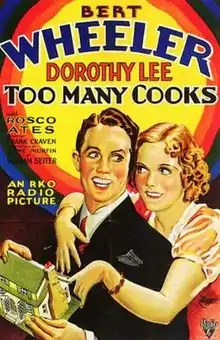Too Many Cooks (film)
Too Many Cooks is a 1931 American Pre-Code comedy film directed by William A. Seiter, written by Jane Murfin, and starring Bert Wheeler, Dorothy Lee, Roscoe Ates, and Robert McWade.[1][2][3] It was released on July 18, 1931, by RKO Pictures.
| Too Many Cooks | |
|---|---|
 Theatrical release poster | |
| Directed by | William A. Seiter |
| Produced by | William LeBaron |
| Screenplay by | Jane Murfin |
| Based on | Too Many Cooks by Frank Craven |
| Starring | Bert Wheeler Dorothy Lee Roscoe Ates Robert McWade |
| Cinematography | Nicholas Musuraca |
| Edited by | Arthur Roberts |
Production company | |
| Distributed by | RKO Radio Pictures |
Release date |
|
Running time | 77 minutes |
| Country | United States |
| Language | English |
Plot
Engaged couple Albert Bennett (Bert Wheeler) and Alice Cook (Dorothy Lee) plan on leaving the city where they both live, in order to build their dream house in the country. They visit the site of their future home, both before, and while it is only the foundation, and later during its continued construction. The happiness over the new foundation soon dissolves as Albert and Alice start to argue about the floor plan, particularly the intended use of one unused upstairs room, whether it should be used as a den for him - "where I can flick cigar ashes all over, and there's no kick coming" or a fully equipped sewing room for Alice. This problem is made worse when dozens of Alice’s family members come to help, each offering different opinions for Alice's proposed use of the room in the new house.
Albert’s bachelor uncle/employer George (Robert McWade) comes to inspect the house, during which time he mentions with great enthusiasm the recent return of a young woman named Minnie, the daughter of a friend of his, who had sent her off to Europe, "finishing her" as in finishing her cultural education, and apparently doing everything extremely well. Uncle George, when he mentions her to Albert, described her desirable virtues to him, and asks if Albert would be able to break off his engagement to Alice honorably, in favor of pursuing a relationship with Minnie. This of course, is immediately, but tactfully refused, with an attempt at describing Alice's virtues in a similarly positive light. Then Uncle George, in debating his own living circumstances with Albert, and Albert's best friend, Frank Andrews (Hallam Cooley) also offered to pay for it, in exchange for living with the newlywed couple on its completion. Alice’s family vehemently opposes, during which time Uncle George again brings up Minnie as someone Albert really should come to see, but another rebuff causes the offended George to fire Albert. Due to his apparent connection with another woman, at least as she hears her mentioned, Alice calls off their engagement, handing her engagement ring back to Albert, and suggesting tearfully that it might fit Minnie.
Time passes, and the unemployed and single Albert completes the house himself, along with the assistance of local townsfolk who hear of his predicament, and decides to sell it. Alice returns to see the now completed house and she and Albert reconcile. A now happily married George (to Minnie no less, who unknown to Alice, came to see the house as it was listed for sale in the paper, in the same horse-drawn jitney in which Alice traveled there) returns and rehires Albert, and buys the house, only to give it to the new couple as a wedding gift.
Cast
- Bert Wheeler as Albert 'Al' Bennett
- Dorothy Lee as Alice Cook
- Roscoe Ates as Mr. Wilson
- Robert McWade as Uncle George Bennett
- Sharon Lynn as Ella Mayer
- Hallam Cooley as Frank Andrews
- Florence Roberts as Mrs. Cook
- George Chandler as Cousin Ned
- Clifford Dempsey as Mr. Michael J. Cook
- Ruth Weston as Minnie Spring
Preservation status
- A copy is preserved in the Library of Congress collection as with many RKO features.[4]
References
- "Too Many Cooks (1931) - Overview". TCM.com. Retrieved August 25, 2014.
- Hall, Mordaunt (August 17, 1931). "Movie Review - The Miracle Woman - THE SCREEN; The Colonel's Lady. Soldiers of the King. A Bungalow for Two. In the News. On Other Screens". NYTimes.com. Retrieved August 25, 2014.
- "Too Many Cooks Trailer, Reviews and Schedule for Too Many Cooks | TVGuide.com". Movies.tvguide.com. Retrieved August 25, 2014.
- Catalog of Holdings The American Film Institute Collection and The United Artists Collection at The Library of Congress, (<-book title) p.186 c.1978 by The American Film Institute